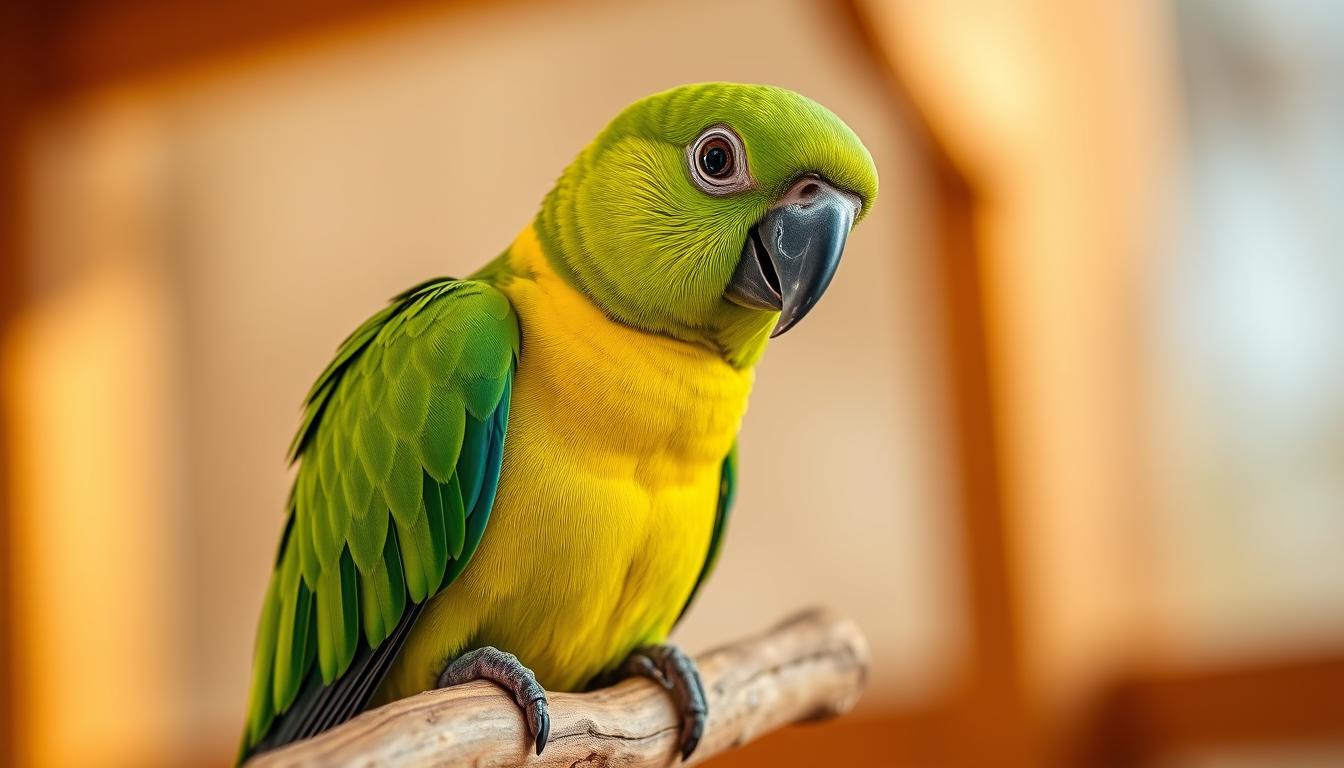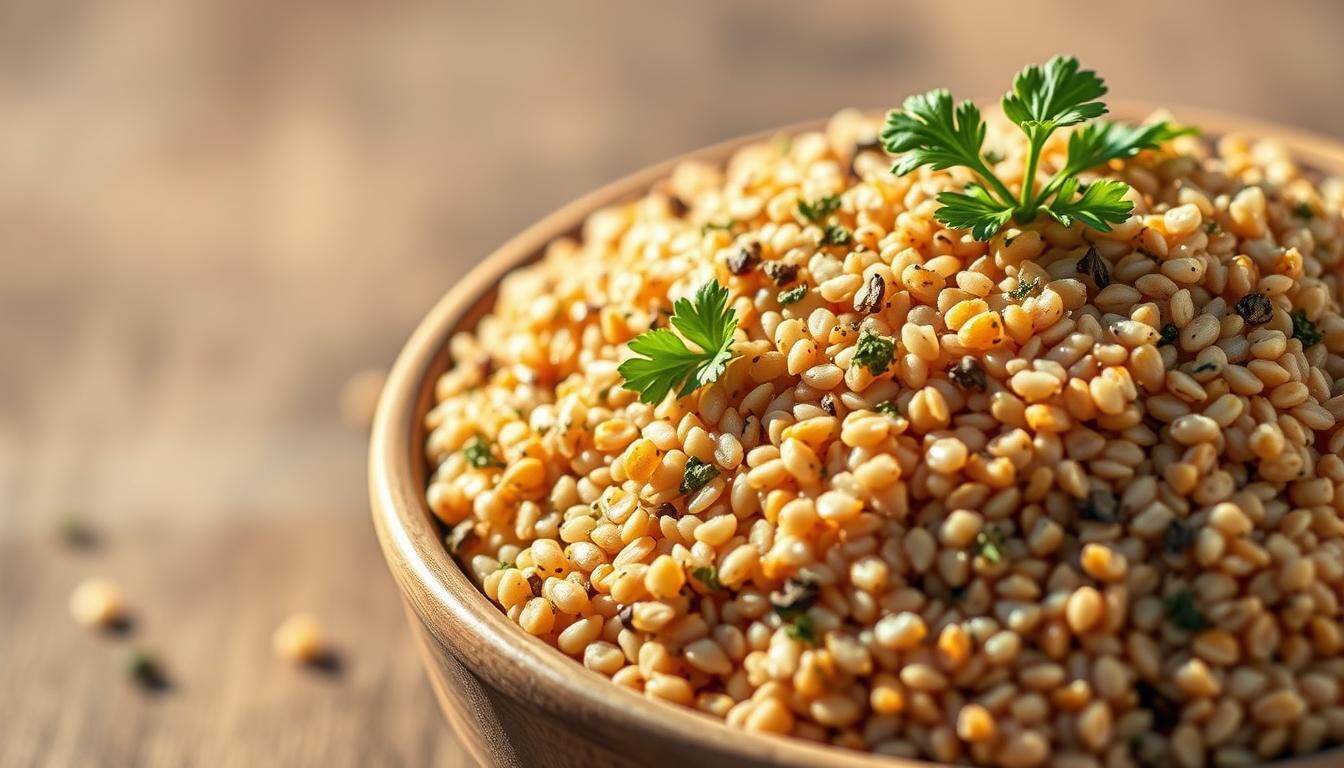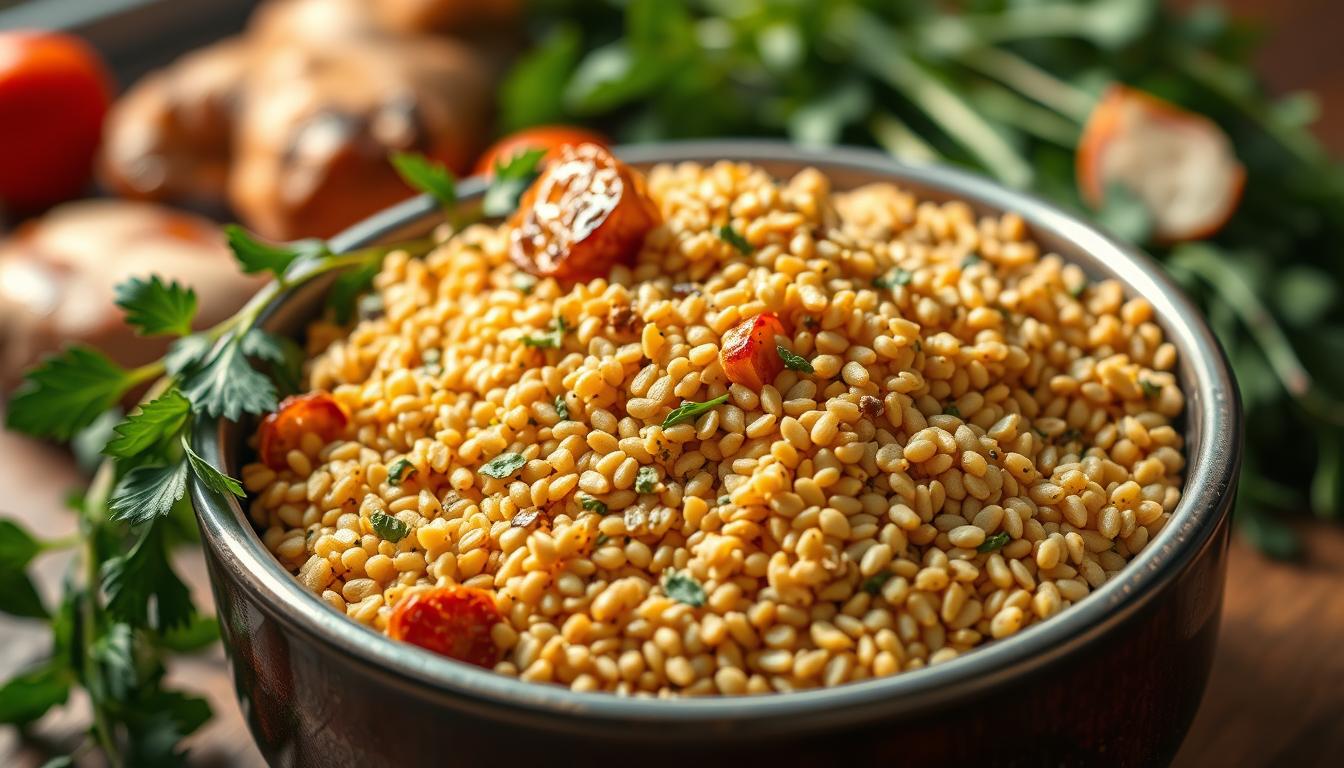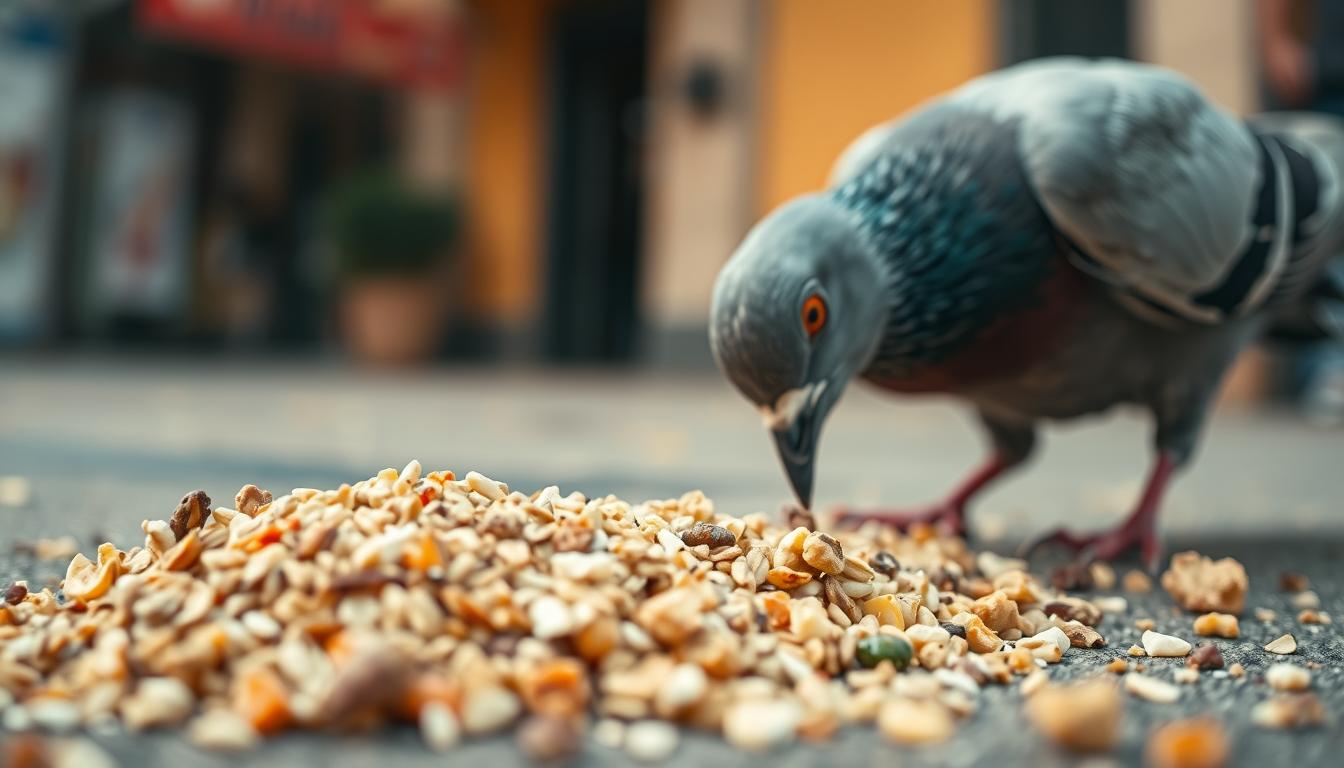Every conure owner dreams of a long, vibrant life with their feathered friend. It’s not just about numbers. It’s about creating a space where your bird can thrive.
Understanding your conure’s life expectancy can be overwhelming. Many owners unknowingly limit their pet’s potential. Simple changes can greatly extend their life.
This guide will show you seven key strategies for exceptional bird care. We’ll cover nutrition, mental stimulation, and more. You’ll learn how to help your conure live a long, happy life.
Malnutrition is a big threat to pet birds, with 70-80% of vet visits related to diet. Knowing these risks helps protect your conure’s health. It can even add years to their life.
Get ready to debunk myths, learn proven methods, and become the amazing conure guardian your bird needs!
Table of Contents
Understanding Conure Lifespan Expectations
When you bring a conure into your home, understanding their potential years of companionship becomes crucial. Conure longevity varies significantly depending on multiple factors. Some species live impressively long lives when provided optimal care.
Exploring the typical years a conure lives reveals fascinating variations across different species. Green-cheeked conures stand out as particularly long-lived companions. They can thrive for 25 to 30 years under excellent care.
Average Lifespans Across Conure Species
- Green-cheeked conures: 10-25 years in captivity
- Sun conures: Approximately 15-20 years
- Jenday conures: Around 20-25 years
- Nanday conures: Up to 20 years
Key Factors Influencing Conure Longevity
Your conure’s lifespan isn’t just a matter of luck. Several critical elements impact their potential years of life:
- Diet quality: Balanced nutrition is paramount
- Regular veterinary check-ups
- Mental stimulation and exercise
- Appropriate living environment
- Genetic predispositions
Interestingly, conures receiving suboptimal care might live an average of just 10 years. But well-cared-for birds can significantly exceed this baseline. Your commitment to their health directly influences their conure longevity.
Common Myths About Conure Lifespan
Many pet owners have wrong ideas about how long conures live. This misunderstanding can affect how they care for their birds. The age range of conures is often not clear, leading to wrong expectations.
Debunking the 10-Year Myth
One big myth is that conures only live for 10 years. This is not true! Actually, many conure species can live much longer. With the right care, they can live 20 to 30 years.
- Myth: Conures are short-lived birds
- Reality: Conures can live up to 30 years or more
- Key factors: Diet, environment, and healthcare
Lifespan Comparisons with Other Birds
Conures live longer than many other pet birds. Studies show they can live longer than many small bird species. This is with the right care.
- Budgies: Typically 5-10 years
- Cockatiels: Around 15-20 years
- Conures: 20-30 years (potentially longer)
To help your conure live a long life, know their needs. Good food, mental games, and vet visits are key. These can help your bird live longer.
The Importance of Diet for Longevity
Your conure’s diet is key to its health and how long it can live. The right food is essential for a long, happy life. Knowing what to feed your bird can greatly affect its age and well-being.
Creating a good diet is vital for your conure’s health. Here are important tips for a long life:
- 60% of the diet should consist of plant-based foods
- Vegetables should dominate this plant-based portion
- Protein needs change with age:
- Young birds need about 20% protein
- Adult birds require 10-15% protein
Essential Nutrients for Optimal Health
Pellets are a great start for your conure’s diet. Experts say 70-90% of your bird’s food should be high-quality pellets made for conures. These pellets keep your bird’s diet balanced and prevent bad eating habits.
Foods to Avoid
Keeping your conure safe means knowing what not to feed it. Foods that can harm your bird include:
- Chocolate
- Caffeine
- Avocado
- Onions and garlic
- Fruit pits and seeds with harmful compounds
By following these diet tips, you can help your conure live a long, healthy life. This ensures your bird stays happy and healthy for years to come.
Creating a Stimulating Environment
Your conure’s environment is key to their happiness and health. A well-designed space can greatly improve their mental and physical health. This is especially true in their senior years.
Optimal Cage Considerations
Choosing the right cage is vital for your conure’s joy and long life. Keep these points in mind:
- Minimum cage size of 24 x 24 x 24 inches for medium-sized conures
- Multiple perches at different heights and textures
- Horizontal bars for climbing and exercise
- Easy-to-clean materials
Importance of Mental Stimulation
Keeping your conure engaged is crucial for their mental health. Activities that prevent boredom are key. They help avoid stress and behavioral problems.
- Rotate toys every few weeks to maintain interest
- Provide foraging toys that challenge problem-solving skills
- Include puzzle feeders and interactive toys
- Ensure daily out-of-cage playtime
By making their environment lively and engaging, you’ll help your conure stay physically and mentally fit for life.
Regular Veterinary Care
Keeping your conure healthy means regular vet visits. These check-ups are key to a longer life for your bird. They also help catch health problems early. A good avian vet can guide you in keeping your conure well.
Selecting the Right Avian Veterinarian
Choosing the right vet is important. Look for someone who knows a lot about conures. Your vet should:
- Specialize in exotic bird healthcare
- Have advanced training in avian medicine
- Possess modern diagnostic equipment
- Demonstrate compassionate patient care
Essential Health Screenings
Annual health exams are a must for your conure’s well-being. These exams usually include:
- Physical body condition assessment
- Weight measurements
- Beak and feather evaluation
- Blood work analysis
- Nutritional status check
With regular vet visits, your conure can live 15-20 years. This care ensures your bird stays healthy and happy for a long time.
Social Interaction and Mental Health
Conure longevity isn’t just about physical health—it’s also about mental well-being. These smart birds love to interact and stay mentally sharp. Knowing their emotional needs can greatly improve their life and how long they live.

Birds feel emotions like humans do. Stress, depression, and anxiety can harm their health and shorten their lives. It’s important to spot signs of emotional trouble to keep your conure happy and healthy.
Bonding with Your Conure
To build a strong bond with your conure, focus on positive interactions. Here are some tips:
- Spend at least 2-3 hours daily interacting directly with your bird
- Use gentle handling and positive reinforcement
- Talk to your conure in a soft, encouraging voice
- Offer treats during training sessions
- Provide a variety of toys for mental stimulation
Signs of Loneliness in Birds
Look out for these signs of emotional distress:
- Feather plucking – Creates bald patches
- Sudden changes in vocalization patterns
- Increased aggression or withdrawal
- Ruffled appearance
- Decreased appetite
By focusing on social interaction and mental health, you can help your conure live a longer, happier life. Emotional well-being is just as crucial as physical care for your bird’s longevity.
Understanding Genetic Factors
Genetic factors are key in figuring out how long conures live. Knowing your bird’s genetic background helps you prepare for health issues. This knowledge is crucial for their well-being.
Genetic traits can greatly affect a conure’s life span. Some inherited conditions can harm their health and happiness. Being aware of these issues lets you take steps to help your bird.
Common Health Issues in Conures
Some genetic health problems are common in conures. These include:
- Feather plucking disorders
- Metabolic bone disease
- Reproductive system complications
- Inherited heart conditions
These issues can shorten a conure’s life if not managed. Regular vet visits can catch and treat these problems early.
Selecting Healthy Birds
When picking a conure, focus on these genetic selection tips:
- Ask for the bird’s genetic health history from trusted breeders
- Check the bird’s family background
- Look for signs of genetic diversity
- Ensure there are clear genetic health tests
Knowing your conure’s genetics helps you give them the best care. This care can greatly improve their life span. A proactive approach to their health is vital.
The Role of Exercise in Lifespan
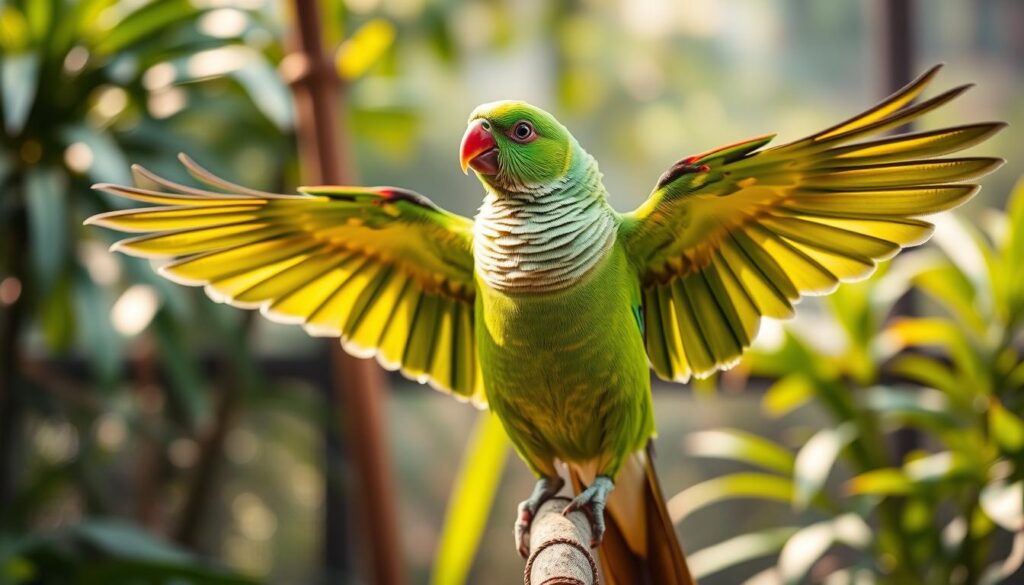
Exercise is key in managing conure aging and increasing their lifespan. It keeps your bird’s muscles strong, mind sharp, and health good. This is important for their whole life.
Keeping your conure active is more than just fun. It’s essential for their long-term health. Exercise helps their heart, prevents weight gain, and keeps their mind active.
Recommended Daily Activities
To help your conure age healthily, try these daily exercises:
- Flight time inside a safe, enclosed space
- Climbing exercises on bird-safe perches
- Interactive toy play
- Foraging games that encourage movement
- Supervised out-of-cage exploration
Outdoor vs. Indoor Exercise
Outdoor exercise can be great, but it has risks. Indoor exercise is safer and keeps your conure fit. Always use a secure harness and watch your bird closely when outdoors.
Try for 2-3 hours of active play every day. This helps your conure stay physically and mentally healthy. Regular exercise can really help your bird live longer and happier.
Keeping Your Conure Safe
It’s vital to protect your conure for a long, healthy life. A safe home environment prevents accidents and health risks. These can shorten your bird’s senior years.
Your feathered friend needs a secure living space. Many unexpected hazards can be found around your home.
Bird-Proofing Strategies
- Remove toxic houseplants like avocado and philodendron
- Cover electrical cords to prevent chewing
- Keep windows and doors closed during out-of-cage time
- Eliminate non-stick cookware that releases toxic fumes
- Secure ceiling fans and prevent access to hot surfaces
Identifying Household Dangers
In your conure’s senior years, health risks grow. Watch your home closely to avoid accidents.
- Check for small objects that could be swallowed
- Avoid using aerosol sprays near your bird
- Keep cleaning chemicals in locked cabinets
- Maintain a consistent room temperature between 70-75°F
- Remove potential choking hazards from play areas
By following these safety tips, you’ll make a safe space for your conure. This can help extend its life significantly.
Final Thoughts on Extending Your Conure’s Lifespan
To make your conure live longer, you need to care for them in every way. Knowing that a Patagonian Conure can live 20-30 years means you must put in a lot of effort. Your hard work can turn a decade of friendship into three decades of fun and connection.
Every part of caring for your bird is important for their long life. Giving them 60% plant-based food and keeping them mentally active are key. Regular vet visits, the right food, exercise, and social time are musts for a happy bird.
By following this guide, you’re not just taking care of a pet. You’re raising a smart, loving friend who can learn many words and feel deep connections. Keeping your conure healthy, happy, and stress-free is crucial for a long, fulfilling life.
Nurturing Long-Term Health
Being proactive about your conure’s health is the best way to extend their life. See each care tip as an investment in a lifelong friendship. Your careful attention can make your conure’s life full of joy, health, and happiness.
FAQ
How long do conures typically live?
Conures can live from 15 to 30 years with the right care. This depends on the species. They are not short-lived pets. With good nutrition, vet care, and a fun environment, they can be great friends for a long time.
What is the most important factor in extending my conure’s lifespan?
The best care is key, and diet is a big part of it. Give them a healthy diet, check-ups, fun activities, and a safe place to live. These things help them live longer.
Do different conure species have different lifespans?
Yes, lifespans vary by species. Green cheek conures live 15-20 years, while sun conures can live 20-30 years. Genetics, diet, and care all affect how long a bird lives.
How can I help my conure live a longer, healthier life?
Focus on six key areas. Give them a good diet, regular vet visits, fun activities, social time, a safe home, and exercise. A balanced diet, vet check-ups, toys, daily talks, safe spaces, and exercise are all important.
What are the most common health issues that affect conure lifespan?
Common issues include respiratory infections, diet problems, obesity, liver disease, and stress. Regular vet visits, a healthy diet, and fun activities can help prevent or manage these problems.
How important is social interaction for my conure’s health?
Very important. Conures need lots of daily interaction. Without it, they can get stressed, depressed, and their lifespan may shorten. Spend time talking, playing, and bonding with your conure every day.
What should I feed my conure to support a long, healthy life?
Feed them a mix of high-quality pellets (70%), fresh veggies, fruits, and occasional seeds. Avoid foods like avocado, chocolate, and caffeine. Talk to an avian vet to make the best diet for your conure.
How can I tell if my conure is aging?
Look for signs like less activity, feather changes, weight loss, muscle loss, and less interest in play. Regular vet visits are crucial as your conure gets older.
Are there any specific safety concerns for aging conures?
Older conures are more prone to injuries and health issues. Make their space safer, provide easy access to food and perches, keep a steady temperature, and see the vet more often to catch health problems early.
Can a conure’s lifespan be genetically predetermined?
While genetics matter, care and environment have a big impact. Choose a bird from a good breeder, give them great care, and watch for genetic health issues. This can help your conure live a long life.
Source Links
- Signs of Bird Malnutrition and How to Save Your Bird Now – https://birdsupplies.com/blogs/news/signs-of-bird-malnutrition-and-how-to-save-your-bird-now?srsltid=AfmBOoqTfHk_6TvQK_p9At0IE-SF5WCxwTmQ6jf60cxRu4Yfx9Vo5RUD
- Bird Safety Alert: 15 Everyday Items That Can Poison Birds! – https://birdsupplies.com/blogs/news/bird-safety-alert-15-everyday-items-that-can-poison-birds?srsltid=AfmBOoqk15rclf65uEFKr7MUVbN5nmG55Y9ZfwBTQJ4gfg6VAMDEkgse
- How Long Do Green Cheek Conures Live? Average Lifespan, Data & Care | PangoVet – https://pangovet.com/pet-health-wellness/birds/green-cheek-conure-lifespan-how-long-do-they-live/
- Can You Tell the Age of a Conure? Our Vet Answers | PangoVet – https://pangovet.com/pet-health-wellness/birds/can-you-tell-the-age-of-a-conure/
- Parrot Hormones: Myths & Realities – https://www.northernparrots.com/blog/parrot-hormones-myths-realities/
- Everyday Articles About Parrots & Pet Birds – Lafeber Co – https://lafeber.com/pet-birds/category/everyday/?srsltid=AfmBOoo4o1oAHaqONFz0iV6h2qXNK60lsu_uEECbvZbmRU6hAdQ5ybzH
- Taming Birds: Facts and Fiction – Avonturia – https://avonturia.com/bird-taming-facts-and-fables/
- 7 Bird Nutrition Secrets Every Owner Should Master – https://birdsupplies.com/blogs/news/7-bird-nutrition-secrets-every-owner-should-master?srsltid=AfmBOopr_VAd4u32Ug_goleXRshcTtk5yCeBuACkYxT9xtin7TnmHCjf
- The Ultimate Guide to Green Cheek Conure Diet: What to Feed Your Feathered Friend for Optimal Health – https://www.theposhperch.com/blogs/bird-talk/the-ultimate-guide-to-green-cheek-conure-diet-what-to-feed-your-feathered-friend-for-optimal-health?srsltid=AfmBOoqiLJpQMjBaIdheVUOd_fjdXgZnS5NXMdoJq2yR-FhUWhYrRAIu
- Top Nutritious Foods to Keep Your Pet Bird Healthy | Petmate – https://www.petmate.com/blogs/petmate-academy/healthy-foods-for-pet-birds?srsltid=AfmBOopjLIqB_t8p3HZ03eQGOSjjW_FrKouehRKQXrm2FH9x0Swa9pne
- Sun Conure Care Guide: Tips & Facts Revealed – https://www.lapetfair.com/sun-conure-care-guide-tips-facts-revealed/
- 4 Ways To Improve Your Sun Conure Lifespan – Parrot World – https://parrotsinfo.net/4-ways-to-improve-your-sun-conure-lifespan/
- How Long Do Sun Conures Live? Average Lifespan, Data & Care | PangoVet – https://pangovet.com/pet-health-wellness/birds/sun-conure-lifespan-how-long-do-they-live/
- Pineapple Conure Green Cheek: Lifespan, Care & Diet Tips – https://kikosparrots.com/pineapple-conure-green-cheek/
- How Long Do Parrots Live? – https://www.thesprucepets.com/how-long-do-parrots-and-other-pet-birds-live-1238433
- What to Know About the Sun Conure – https://www.webmd.com/pets/what-to-know-sun-conure
- Which Pet Birds Live the Longest? | myBird – https://myrightbird.com/articles/which-pet-birds-live-the-longest
- Is Your Pet Parrot Stressed, Depressed, or Anxious How To Tell If It Is And What To Do To Stop It. – https://www.theposhperch.com/blogs/bird-talk/is-your-pet-parrot-stressed-depressed-or-anxious-how-to-tell-if-it-is-and-what-to-do-to-stop-it?srsltid=AfmBOorGmQvqHUp43l7qkuPnP9evJaUTp642eJ0JJHAHKQJnKXqgytA9
- Understanding Parrot Lifespan: Comprehensive Conclusions from Key Factors – https://poparrots.com/2024/03/12/understanding-parrot-lifespan-comprehensive-conclusions-from-key-factors/?srsltid=AfmBOoqal5EBvUZ3iajKfBHplvpymZqxiEt-DXFa_hYfr0vYOEEYp_5T
- Bird Life Expectancy – How Long Can Birds Live? – https://www.birdfy.com/blogs/blogs/bird-life-expectancy-how-long-can-birds-live?srsltid=AfmBOorla8jfFxzp9C_IDQMyiT3ICtXb1vP1Xf45MPsxAcsdFe6OI_lz
- Color Mutation in Same-species Parrots – https://www.birdstreetbistro.com/blogs/parrot-blog/editing-parrot-color-mutation-confusion?srsltid=AfmBOooLExRVjdQqIlqcqbNGmxB8znbATw8JTEpQXGaEpVesLOH39Cuh
- How Long Do Parrots Live? Vet-Approved Average Lifespan, Data & Care | PangoVet – https://pangovet.com/pet-health-wellness/birds/parrot-lifespan-how-long-do-they-live/
- How Long Do Parrots Live? – https://be.chewy.com/how-long-do-parrots-live/
- Green Cheek Conure Lifespan (How Long do Green Cheek Conures Live) – https://www.linkedin.com/pulse/green-cheek-conure-lifespan-how-long-do-conures-live-dr-anees-ashraf-xprdf
- How to Take Care of Conures: Vet-Verified Fledgling & Juvenile Care Guide | PangoVet – https://pangovet.com/pet-health-wellness/birds/how-to-take-care-of-baby-conure-birds/
- Patagonian Conure – Profile & Care Guide – https://parrotessentials.co.uk/blog/patagonian-conure-profile-care-guide
- 7 Bird Nutrition Secrets Every Owner Should Master – https://birdsupplies.com/blogs/news/7-bird-nutrition-secrets-every-owner-should-master?srsltid=AfmBOoryqFVZyGq2lo8uzZclgxI7FLtOq0TxKw4Y1DTCK-MRjmJ8iPGU
- Patagonian Conure: Info, Personality, Food & Care Guide | PangoVet – https://pangovet.com/pet-breeds/birds/patagonian-conure/

